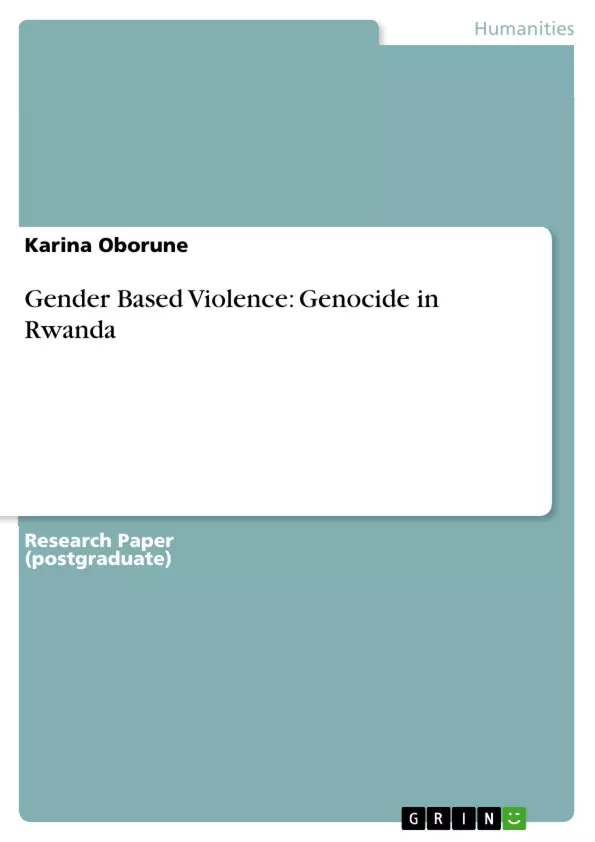Abstract
The research deals with the analysis of genocide in Rwanda in gender-specific terms. The paper identifies differences in gender related issues in two phases of conflict: open conflict and post conflict phase and on three levels: individual, community and state level with the focus on gender-based violence and intersectionality. The lack of analysis of men as victims and women as perpetrators in genocide in Rwanda still highlights the undiscovered issues of this fifteen year old conflict. Keywords: gender, violence, genocide, Rwanda.
Inhaltsverzeichnis (Table of Contents)
- Open conflict phase
- Individual level
- Community level
- State level
- Post-conflict phase
- Individual level
- Community level
- State level
Zielsetzung und Themenschwerpunkte (Objectives and Key Themes)
This research paper analyzes the Rwandan genocide through a gender-specific lens. It examines the role of gender in different phases of the conflict (open conflict and post-conflict) and on multiple levels (individual, community, and state). The paper focuses on gender-based violence and intersectionality, highlighting the lack of analysis regarding men as victims and women as perpetrators in the Rwandan genocide.
- Gender-based violence as a key factor in the Rwandan genocide.
- The intersectionality of gender, ethnicity, and social status in shaping experiences during the conflict.
- The lack of analysis concerning men as victims and women as perpetrators of violence.
- The impact of rape on individuals, communities, and the state.
- The importance of considering gender-specific context in peacebuilding and mediation processes.
Zusammenfassung der Kapitel (Chapter Summaries)
The paper examines the role of gender in the Rwandan genocide, analyzing the open conflict and post-conflict phases on the individual, community, and state levels.
Open conflict phase
- Individual level: Both men and women participated in the violence and experienced sexual violence. Women were active participants in the conflict, both in leadership and as foot soldiers. Rape and other forms of sexual violence were widespread, targeting women of all ages, including pregnant women.
- Community level: Rape is considered a key weapon in wartime, symbolically violating the purity of the community and emasculating men in their role as protectors. The act of rape can result in the ostracization of victims from their families and communities.
- State level: Propaganda and media played a significant role in fueling the violence by portraying women as sexual objects and men of the “other” community as feminized.
Post-conflict phase
- Individual level: Women and men suffer from post-traumatic stress disorder as a result of violence, torture, and killings. Women ex-combatants have specific sexual and reproductive health needs. Women face social exclusion and discrimination, and their chances of marriage are reduced.
- Community level: Many women have become single heads of households or widows, while others face domestic violence and human rights violations. Access to land is an important issue, as women are often dependent on it for food security.
- State level: Despite some progress in gender representation in parliament, peace talks are still dominated by men.
Schlüsselwörter (Keywords)
The key terms and concepts explored in this paper include gender, violence, genocide, Rwanda, intersectionality, rape, peacebuilding, mediation, post-traumatic stress disorder, and land rights.
Frequently Asked Questions
What is the focus of the research on the Rwandan genocide?
The research focuses on analyzing the genocide through a gender-specific lens, looking at gender-based violence and intersectionality.
How was gender-based violence used during the open conflict phase?
Rape was used as a weapon of war to violate the community's purity and emasculate men. Both men and women were participants and victims.
What gender issues are identified in the post-conflict phase?
Key issues include PTSD, social exclusion of victims, land rights for widows, and the reproductive health needs of female ex-combatants.
What is the "intersectionality" mentioned in the study?
It refers to how gender, ethnicity, and social status combined to shape individual experiences during and after the genocide.
Are women considered only as victims in this analysis?
No, the study specifically highlights the often-overlooked role of women as perpetrators and active participants in the violence.
- Arbeit zitieren
- Karina Oborune (Autor:in), 2009, Gender Based Violence: Genocide in Rwanda, München, GRIN Verlag, https://www.hausarbeiten.de/document/153259


